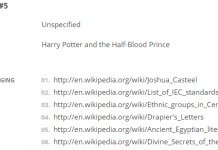As statements of the crashingly obvious go, the speech by Y.S. Chi, chairman of Elsevier and president of the International Publishers Association, to the UK Publishers Association’s International conference that publishers have an “image problem” takes some beating. As reported in The Bookseller, Chi said in his keynote that “We as an industry have an image problem . . . We are no longer the guardian of culture. we are now seen as greedy, as locking up knowledge.”
 Well, I wonder where anyone got that impression? After all, the Apple price-fixing conspiracy would never have led anyone to think that. Or the copyright-driven boycotting of works like George Orwell’s 1984 within the U.S. when these are available for completely free download right over the border in Canada. Big Publishing may not have learned the lessons about business models and digital rights that the music and movie industries were waiting to teach it, but you’d think it could have bought the message about the huge reputational issues of being a media dog-in-the-manger these days. Apparently not.
Well, I wonder where anyone got that impression? After all, the Apple price-fixing conspiracy would never have led anyone to think that. Or the copyright-driven boycotting of works like George Orwell’s 1984 within the U.S. when these are available for completely free download right over the border in Canada. Big Publishing may not have learned the lessons about business models and digital rights that the music and movie industries were waiting to teach it, but you’d think it could have bought the message about the huge reputational issues of being a media dog-in-the-manger these days. Apparently not.
Chi put this sad situation for publishing down to public ignorance. “There is a big disconnect between how much we are doing and how much is known about what we do,” he said. This is why it is possible, in his view, to stigmatize publishers as “dinosaurs.” He would rather that publishers went on the offensive to explain to and convince the public. “We will see over the next 12 months messages and target audiences, and who is going to deliver those messages.”
Will it work? Well, as a longtime practitioner in the public relations industry, when not writing for TeleRead and otherwise slumming it, I can tell you one maxim that we constantly try to impress on reluctant and hesitant CEOs: Never lie. Never lie to yourself, or anyone else, about what you’re doing. People will always know what you are up to sooner or later, and in this connected age, there is nowhere to hide. No amount of spin or tweaking will get around that. So, if Y.S. Chi tells the PA that publishers are now “seen as greedy, as locking up knowledge,” well … is that because this is exactly what they’re doing? An awful lot of people seem to think so. Specifically, about Elsevier itself. And since Elsevier is apparently asserting control over such knowledge as “trypanosome monophyly: a comparative genomics approach using whole genome data sets,” its actions can clearly have immediate, pharmacological and medical impacts far beyond the cultural and literary spheres.
Elsevier’s own image management machine has been working full blast since the news of its takedown notices against researchers broke. But it doesn’t seem to have succeeded in dispelling the impression that … Elsevier is locking up knowledge. And as a PR and sometime publishing pro, here is my reputation management advice: Stop locking up knowledge. It’s that simple.
[Elsevier’s image problems in this respect are hardly new. Last year, academics announced a boycott of the journal publisher due to its support of a controversial law that would have privatized previously public research. Elsevier subsequently dropped support for the law. —CM]


































Of course Elsevier and the rest of the old school scholarly publishing community cannot stop making knowledge scarce. They believe that they perform a service for which they should be paid. Payment is traditionally in the form of the author transferring copyright that enables them to make exclusive offers of that knowledge for sale. They have been denied what is due to them if the article (knowledge) becomes available for free at any point. Of course there are new and emerging alternatives. Gold Open Access has the author paying for the service that the publisher provides. There is also Green Open Access publishing which apparently requires an eleemosynary publisher. There is government and foundation supported Green OA but it remains to be seen whether that model is sustainable.
Compared to the trade press, scholarly publishing is far more difficult to understand.